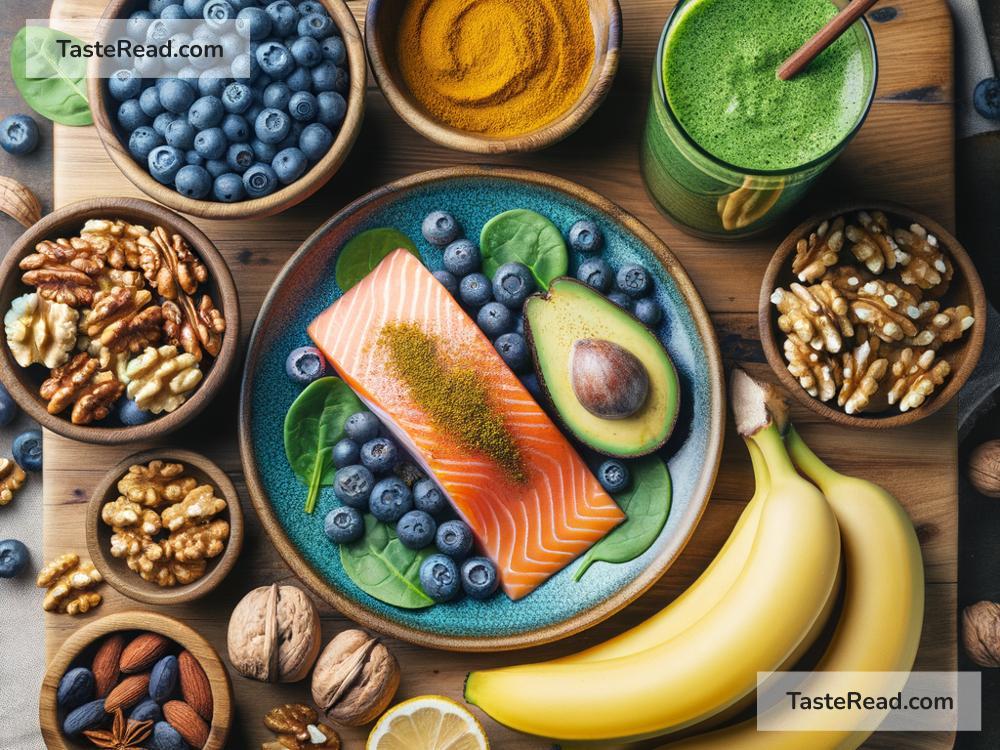The Brain Food Connection: Delicious Ways to Boost Neural Connectivity
Our brains are like supercomputers, constantly sending messages and information across networks of tiny nerve cells called neurons. These connections between neurons—a process known as neural connectivity—are essential for thinking, learning, memory, and overall brain health. Just like our bodies need nourishment to stay healthy, our brains also rely on certain foods to function at their best.
In this blog, we’ll explore how you can enhance your neural connectivity by adding brain-friendly foods to your diet. The good news? Many of these foods are delicious, simple to prepare, and easy to find! Let’s dive into the world of brain food.
Why Neural Connectivity Matters
First, let’s quickly understand neural connectivity. Think of your brain like a city filled with roads connecting different neighborhoods. To keep everything running smoothly, the “roads” need to be maintained, and traffic (information) needs to flow freely. When neural connectivity is strong, you can process information faster, think more clearly, and even improve problem-solving skills.
Foods that enhance neural connectivity do so by providing nutrients that reduce inflammation, protect brain cells, and support communication between neurons. Your diet plays a huge role in sharpening your brain, so let’s discover the foods that can make a difference.
Top Foods to Improve Neural Connectivity
1. Fatty Fish
Fatty fish like salmon, mackerel, and sardines are rich in omega-3 fatty acids, which are absolutely essential for brain health. Omega-3s help build cellular membranes around neurons and ensure strong connections between brain cells. Research has even linked omega-3s to better memory and reduced risk of mental decline.
If fish isn’t your favorite, you can also consider plant-based omega-3 sources, such as flaxseeds, chia seeds, and walnuts.
2. Blueberries
Blueberries are often called “brain berries” for a good reason. These small, sweet fruits are packed with antioxidants like flavonoids, which help reduce inflammation and protect neurons from damage caused by free radicals. Free radicals are harmful molecules that can affect brain cell communication.
Eating blueberries regularly could improve memory and help your brain stay healthy as you age. Other berries, such as strawberries and blackberries, can also provide similar benefits.
3. Avocados
Avocados are loaded with healthy fats, especially monounsaturated fats, which are great for brain health. These fats maintain healthy blood flow to the brain, which is crucial for keeping neural pathways open and active.
Plus, avocados are rich in vitamin E, an antioxidant that protects brain cells from damage. You can enjoy avocados in salads, on toast, or blended into smoothies for a creamy texture and a nutritional boost.
4. Dark Chocolate
Dark chocolate (at least 70% cocoa) is not just a treat—it’s also beneficial for your brain! It contains flavonoids, similar to those found in blueberries, which improve blood flow and protect neurons. Eating dark chocolate in moderation can enhance focus, mood, and cognitive function.
Be mindful not to overindulge, though—a small square or two is enough to keep the benefits without adding too much sugar.
5. Leafy Greens
Leafy greens like spinach, kale, and broccoli are full of nutrients like vitamin K, lutein, and folate. These nutrients help repair brain cells, support neural connectivity, and keep your memory sharp.
If you’re not a fan of salads, try sautéing your greens with garlic and olive oil for a flavorful side dish.
6. Nuts and Seeds
Walnuts, almonds, pumpkin seeds, and sunflower seeds are amazing for your brain. They are rich sources of vitamin E, which protects brain cells from oxidative stress and ensures smoother neuron communication.
Walnuts, in particular, look like tiny brains—and it turns out they’re one of the best nuts for brain health because of their high omega-3 content.
7. Whole Grains
Whole grains like oats, brown rice, and quinoa provide a steady source of energy to your brain. Since your brain uses glucose for fuel, eating whole grains ensures long-lasting energy rather than the spikes and crashes caused by sugary foods.
Whole grains also contain fiber, which helps regulate blood flow to the brain and supports neural function.
8. Eggs
Eggs are rich in nutrients like choline, which is key for producing brain chemicals (neurotransmitters) that help neuron communication. They also contain B vitamins, which improve memory and protect against age-related brain decline.
Start your day with a hearty breakfast of eggs to give your brain the boost it needs!
Tips for Eating Brain-Boosting Foods
- Mix It Up: Combine different brain-friendly foods for maximum benefits. Try a salad with spinach, avocado, walnuts, and a sprinkling of blueberries.
- Plan Ahead: Stock up on healthy snacks like nuts, seeds, and dark chocolate to avoid reaching for processed junk foods.
- Drink Enough Water: Hydration plays a vital role in brain function, so pair your meals with plenty of water.
Remember, small daily changes in your diet can lead to big improvements over time. Don’t think of eating for brain health as a chore; instead, see it as an opportunity to enjoy tasty and nutritious foods while boosting your mental abilities.
Conclusion
Enhancing neural connectivity doesn’t require fancy supplements or complicated diets. The best foods for your brain are natural, wholesome, and readily available. Whether it’s enjoying a plate of salmon, snacking on blueberries, or savoring dark chocolate, you can give your brain the nutrition it deserves with simple, delicious choices.
So, the next time you prepare a meal or reach for a snack, consider your brain as it says, “Thank you” for the nourishment. Start eating for better neural connectivity today, and unlock your brain’s full potential, one bite at a time!


